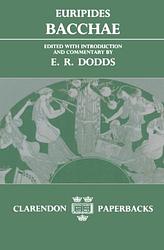The Bacchae by Euripides
"The Bacchae" is a classic Greek tragedy where the god Dionysus, disguised as a mortal, returns to his birthplace in Greece to punish the impious King Pentheus who denies Dionysus's divine nature and refuses to worship him. The narrative explores themes of revenge, mortality, and the relationship between man and god. Dionysus uses his power to drive the women of the city into a crazed frenzy, leading to a tragic end for King Pentheus and his mother Agave.
The 377th greatest book of all time
Ranking Details:
Our ranking system awards points to books based on their appearance and position on curated lists. Here's how it works:
Unranked Lists: For lists without specific rankings, each book receives points equivalent to the list's weight. This approach recognizes the book's inclusion on prestigious lists.
Ranked Lists: Books on ranked lists receive points in two ways:
- Base Points: Initially, every book is awarded points equal to the list's weight, acknowledging its significance.
- Bonus Points: Additionally, books earn bonus points based on their ranking. The total bonus pool, equal to 100% of the list's weight, is distributed among the books, with higher-ranked books receiving more points.
Exponential Distribution: The distribution of bonus points follows an exponential model. This means the top-ranked book (#1) receives significantly more bonus points than those further down the list (e.g., #100). Our algorithm ensures that higher placements are rewarded more generously, reflecting the achievement of a top rank on any given list.
This scoring system ensures that each book's ranking reflects both its presence on multiple lists and its positions within those lists, providing a comprehensive measure of its acclaim and popularity.
Total Points: 875
Since this book was first published in -405, there is a penalty of 0%. The age adjusted score is 875.0.
This is to prevent newer books from reaching super high on the ranked list of the greatest books of all time. The greatest books should also stand the test of time.
- score: 126 -- Best Foreign Work of Fiction Chosen by Francophone Writers (Weight: 126)
- score: 104 -- The 16 Greatest Books of All Time (Weight: 99)
- score: 99 -- The New Lifetime Reading Plan (Weight: 99)
- score: 90 -- Our Users' Favorite Books of All Time (Weight: 90)
- score: 85 -- 100 Best Books (Weight: 84)
- score: 75 -- Masterpieces of World Literature (Weight: 75)
- score: 63 -- Books That Changed the World (Weight: 63)
- score: 57 -- Great Books (Weight: 57)
- score: 57 -- One Hundred Best Books (1916) (Weight: 57)
- score: 51 -- Harold Bloom's The Western Canon (Weight: 51)
- score: 39 -- 1,000 Books to Read Before You Die: A Life-Changing List (Weight: 39)
- score: 28 -- The Drama 100 - A Ranking of the Greatest Plays of All Time (Weight: 27)

